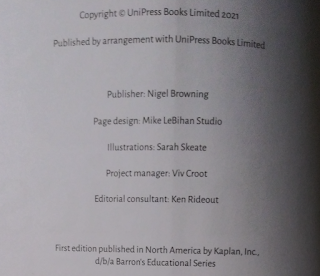Izze and I made a run to Barnes and Nobles today. As we were driving there, I reflected to her: I bet you could poll families about what is the first non-essential venue they went to after the pandemic set in a few years ago and the result will tell you something essential about them. So, after work, school, and groceries - where did your family go first? For the Rideouts, it was the book store. Interesting and revealing, right?
Now, full confession time: Every time I go to the book store, I go straight to study aids section and look the books I wrote or co-wrote for Barrons. I look at them for a second (maybe re-arrange the shelf discretely while no one is looking) and then go about my business. I'm embarrassed by this but I also feel, how could I not?
Today, I was in the science aisle and browsing when I saw one of my books there too! I had never thought to look for it in this section.
Then I noticed another Barron's book that look oddly familiar. I picked it up and flipped through it. All of the pages looked familiar and then I remembered.
A few years ago I did some consulting for a physics-in-pictures kind of book. It turned out to be many more back-and-forth iterations than originally anticipated and the editor had promised me an editorial credit in the book. As the pandemic dragged on longer than anyone could have imagined, I lost track of the project.
I went ahead and bought a copy for myself.


















